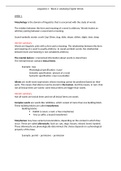Linguistics 1 - Block 2: Analyzing English Words
WEEK 1
Morphology is the domain of linguistics that is concerned with the study of words.
The relation between the form and meaning of a word is arbitrary. Words involve an
arbitrary pairing between a sound and a meaning.
Sound-symbolic words: crash! Zap! Slime, slug, slide, sleaze, slither, slight, slow, sleep
Interim summary
Words are linguistic units with a form and a meaning. The relationship between the form
and meaning of a word is usually arbitrary. In sound-symbolic words, the relationship
between form and meaning is not completely arbitrary.
The mental lexicon = memorized information about words is stored here
The mental lexicon contains lexical items.
Example: rose
Phonological specification: /rəʊz/
Semantic specification: (picture of a rose)
Syntactic specification: noun (countable)
Idioms are multi-word expressions whose meaning cannot be predicted based on their
parts. This means that idioms must be stored in the lexicon. And this means, in turn, that
not all lexical items are words; some lexical items are bigger than words.
Interim summary
Not all words are lexical items and not all lexical items are words.
Complex words are words like rabbitless, which consist of more than one building block.
These building blocks are called morphemes.
Building blocks:
Rabbit (a noun; a root; a free morpheme)
-less (a suffix; a bound morpheme)
Morphemes may have variant pronunciations, depending on the context in which they
occur. These are called allomorphs. Such as: cats, dogz, houses, missed, loved, handed.
These allomorphs are phonologically determined; the choice depends on a phonological
property of the base.
Example: permit – permissive – permission
, Linguistics 1 - Block 2: Analyzing English Words
WEEK 2 - INFLECTION
Have and having are inflectional variants of a more basic form HAVE. This basic form is
called a lexeme. The inflectional variants of lexemes are sometimes called grammatical
words because their shape is determined by the grammatical context.
Grammatical conditioning: I’ll have what you’re having.
Example of inflection: The appropriate form of EAT, i.e. eaten, is conditioned
by the grammar. When following the perfect auxiliary
has, EAT must occur in its perfect participle form.
Derivation: The … has just gone mad.
One option would be the noun speaker.
This is an example of a so-called agentive noun, which is formed by adding the suffix -er to
the verbal base speak. However, the grammar doesn’t require and agentive noun in this
context. Any noun will do if that noun is animate.
The formation of agentive nouns is an example of derivation, not inflection. It’s not
grammatically conditioned.
The classes (lexical categories) in which English can be inflected are:
Verb V
Noun N
Adjective A
Verbal inflection
Lexeme: KICK
Inflectional variants: kick, kicks, kicked, kicking
Regular verbs have four inflectional variants. These variants are not necessarily stored in the
lexicon, because their forms are predictable.
Syncretism: some inflectional variants serve different functions:
I/you kick the ball. PRESENT NON-3RD SINGULAR





